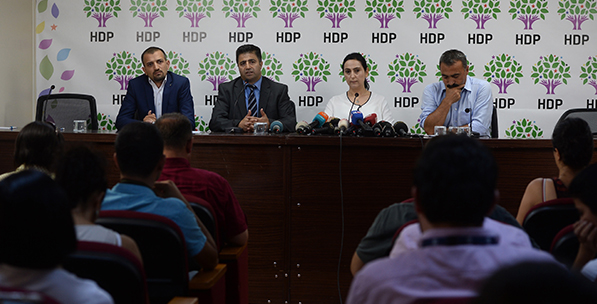To the surprise of many analysts the Peoples' Democratic Party (HDP) achieved an unprecedented victory by receiving 13 percent of the vote in the June 7 general elections. No other party that is affiliated with Kurdish nationalism in Turkish history has achieved such a high percentage of votes, let alone pass the 10 percent national election threshold. Consequently, the HDP won 80 seats in Parliament and became the third biggest party, sharing this place with the party representative of Turkish nationalism, the Nationalist Movement Party (MHP). This dramatic development gave hope to many observers of Turkish politics that the HDP will be able to appeal to the whole of the Turkish electorate and contribute to the reconciliation process by sidelining its armed wing, the PKK, and become the main and only legitimate representative of Kurdish nationalism.
A PYRRHIC VICTORY
However, the developments following the elections and breakdown of the reconciliation process demonstrated that the HDP's unprecedented success in the elections was indeed a pyrrhic victory. In order to pass the 10 percent election threshold, the HDP based its whole election campaign in opposition to President Recep Tayyip Erdoğan, which at times even articulated itself as an Erdoğan -hate campaign. By doing so the HDP wisely aimed at the anti-Erdoğan atmosphere that accumulated after the Gezi Park protests. Consequently, the HDP won votes from different segments of Turkish society that never voted for Kurdish nationalist parties before and the Justice and Development Party (AK Party) lost its majority in Parliament. However, this victory also came with a cost, the undermining of Erdoğan, who was the main initiator and protector of the reconciliation process since 2005. One should not forget that the reconciliation process was undertaken on Erdoğan's initiative and he took a huge political risk by initiating democratic reforms and negotiations with the imprisoned leader of the PKK, Abdullah Öcalan. It was Erdoğan's courageous steps that gave cultural rights to Kurds in Turkey and convinced the wider public about the necessity of the reconciliation process with the PKK. Therefore by attacking and demonizing Erdoğan, the HDP also undermined and poisoned the basis of the reconciliation process. Furthermore, the HDP developed a double strategy regarding its election campaign. On one hand, in the western regions of Turkey, the HDP presented itself as the main defender of democratic values that will prevent Erdoğan from introducing a presidential system. On the other hand, the HDP followed a different election strategy in the southeast by building on the Kurdish nationalism that was on the rise after the Islamic State of Iraq and al-Sham (ISIS) attacked Kobani in Syria. Additionally, PKK militants put pressure on Kurdish voters in the distant rural areas by threatening them with consequences if they did not vote for the HDP. The results of the elections in thousands of small villages where the HDP got 100 percent of the vote are solid proof of this intimidation. This and many other incidents demonstrated that the PKK has misused the cease-fire era by trying to build a quasi-state structure with its own prisons and courts.
Despite these developments, there was still a positive atmosphere right after the elections regarding the future of the reconciliation process in Turkey. Many analysts thought that the HDP would finally become a legitimate political force accelerating the disarmament of the PKK. Yet the developments after the elections proved that this was an illusion at best, as the HDP and PKK leadership did not read the situation from this perspective. The HDP and PKK read the results of the elections as a clear approval of the HDP and PKK's policies in the east and west of Turkey. So when everybody was expecting more peaceful rhetoric from the HDP and PKK it was a big disappointment to hear radical and violent statements from HDP politicians and the PKK leadership. Right after the elections, one HDP deputy threatened village g









